Prologue: Yesterday, a mass murder occurred at Robb Elementary School in Uvalde, Texas, resulting in twenty-one people dead, 19 children and 2 adults. They were shot dead by an 18-year-old high school student who was from the community. Eleven days ago, another mass shooting occurred with 10 killed; this was in Buffalo, New York at a supermarket and the shooter, another 18-year-old, targeted Black folx. We, humanity, are suffering from great losses. We are in pain. And this is the context in which I write this post.
On Friday, May 20, 2022, a community celebrated the life of one Ms. Wilhelmina Holder–mother, activist, advocate, educator, friend. I knew of Ms. Holder before I knew her. A teacher-friend explained how he met her at his school, West Side, and that she told him about Abbott Leadership Institute (ALI). ALI held Saturday classes at Rutgers-Newark for parents and community members to teach them about policy, organizing, and advocacy in the space of education. Ms. Holder was an honor roll student of ALI, holding a close friendship with the director, Junius Williams.
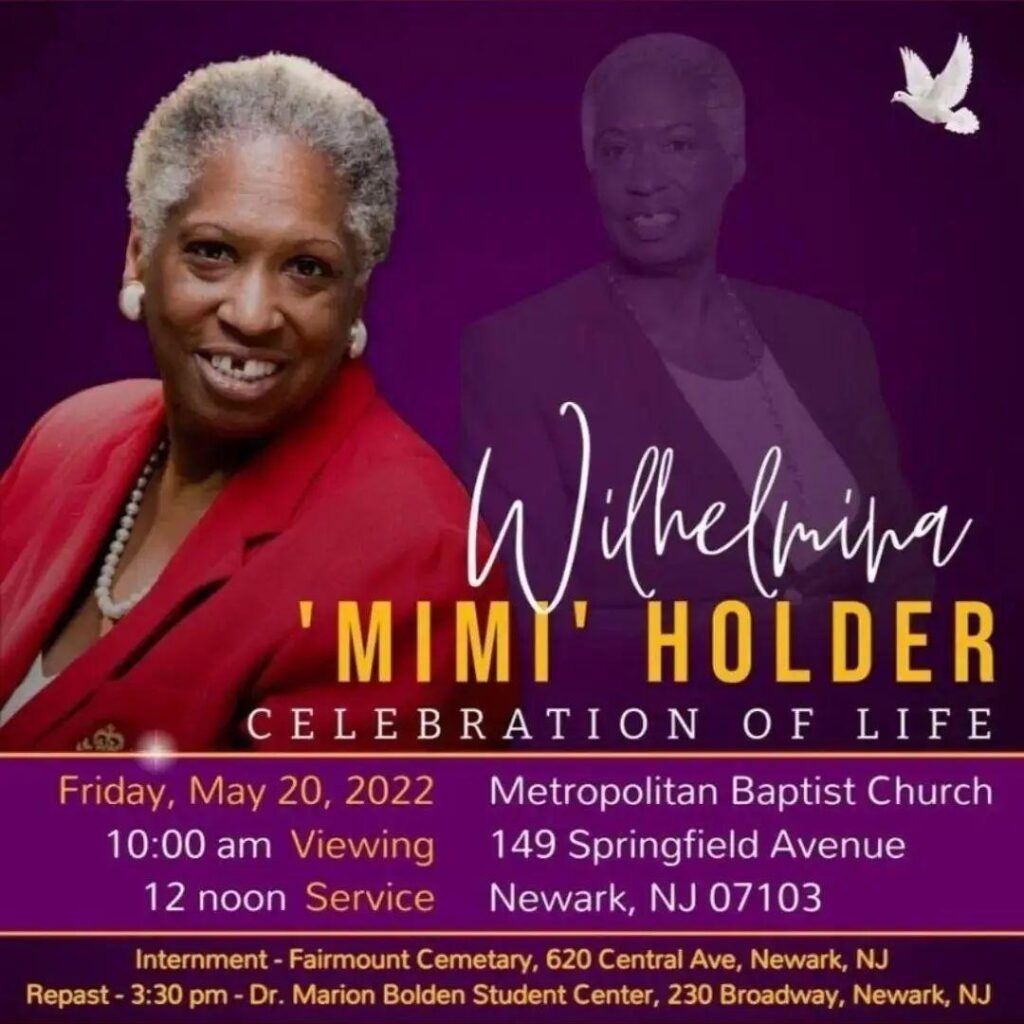
I was a second- or third-year teacher (2006/2007) when I attended my first ALI class and remember being struck by the information presented about a pro-privatization school reform plan called Renaissance 2010 in Chicago. But even more striking was the power of the everyday Black folx sitting in that room. Newarkers. Smart and learning more. Leaders. This wasn’t the picture of inner city parents painted by Savage Inequalities, a book I had read in undergrad. In fact, it isn’t the story told by most of the literature about urban education reform. If not carefully curated, the syllabi of courses for prospective teachers can easily lead them to believe that they are the only hope for their students. ALI was framed by a critical pedagogical approach; it put the gross reality of Newark public schools in the context of power, leadership, and transformation. And it provided space for Ms. Holder, and others like her, to build on the strengths they brought to the table.
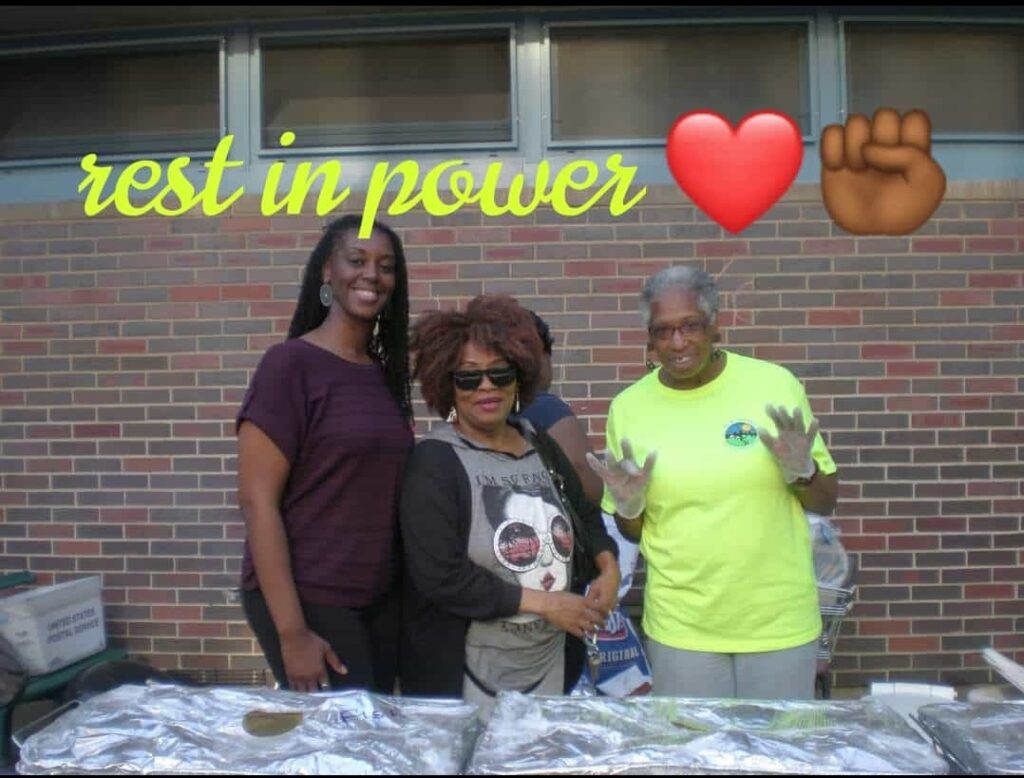
It did not take much time for me to come to admire and love Ms. Holder. As my elder, I knew she had earned the right to say anything she wanted, but her outspokenness I saw coming from a different place. I wanted to come from that place too–at the intersection of love, passion, commitment, knowledge, and experience. So, in February 2021, I answered a call put out by Kaleena Berryman–longtime assistant to Junius Williams turned ALI director upon his retirement–to get as many people as possible to nominate Ms. Holder for the Russ Berrie Making a Difference Award–and she won!
I‘d like to share what I submitted:
Q: How has the Nominee “made a difference” in the lives of others, or in the community? Why is this work important?
A: Ms. Holder has assisted countless students and their families navigate the educational system so that they can discover success. She is one of the most civically-engaged people in the city of Newark, serving on numerous boards and councils as both a member and a leader of them. Her input and decision-making is always grounded in the real experiences of young people and families. Ms. Holder has also led the High School Academic Support Program which provides direct assistance, care, and love to high school students in their process of applying to college. Her expertise in this area is incomparable. Ms. Holder’s work is so important because it speaks to what we can accomplish as a community when we believe in each other and our young people especially.
Q: What are the Nominee’s major accomplishments?
A: Through Ms. Holder’s work in the High School Academic Support Program, she has helped graduating seniors secure hundreds of thousands of dollars in scholarships. The Program also hosts on-the-spot college admissions nights, assisting hundreds of students to matriculate into college.
Q: Please respond to this in your own words. “This person should receive the Russ Berrie Making a Difference Award because…”
A: Ms. Holder should receive the Russ Berrie Making a Difference Award because she gives of herself with no expectation of anything in return. Ms. Holder is a true definition of selflessness. We love her here in Newark and believe she deserves to be recognized by the world!
Ms. Holder’s obituary and news articles written about her passing (see here and here) outline well who she was and the life she lived. Extra touching are two memorializing pieces written by Kaleena. In the tribute printed on the homegoing program, Kaleena writes about Ms. Holder’s creation: “He was surely creating someone to do [H]is work, for over five decades, in schools and for children that would need His power and presence” and that “She needed to be able to mold others, just by being.” Both tributes speak to the dispositions (i.e., ways of being) forged in fire of a leader committed to education justice. Here, I highlight, from Kaleena’s poem “A tribute to Wilhelmina, OUR HOLDER,” some of those critical dispositions–those values, beliefs, and habits of mind that oriented Ms. Holder toward the just response to injustice.
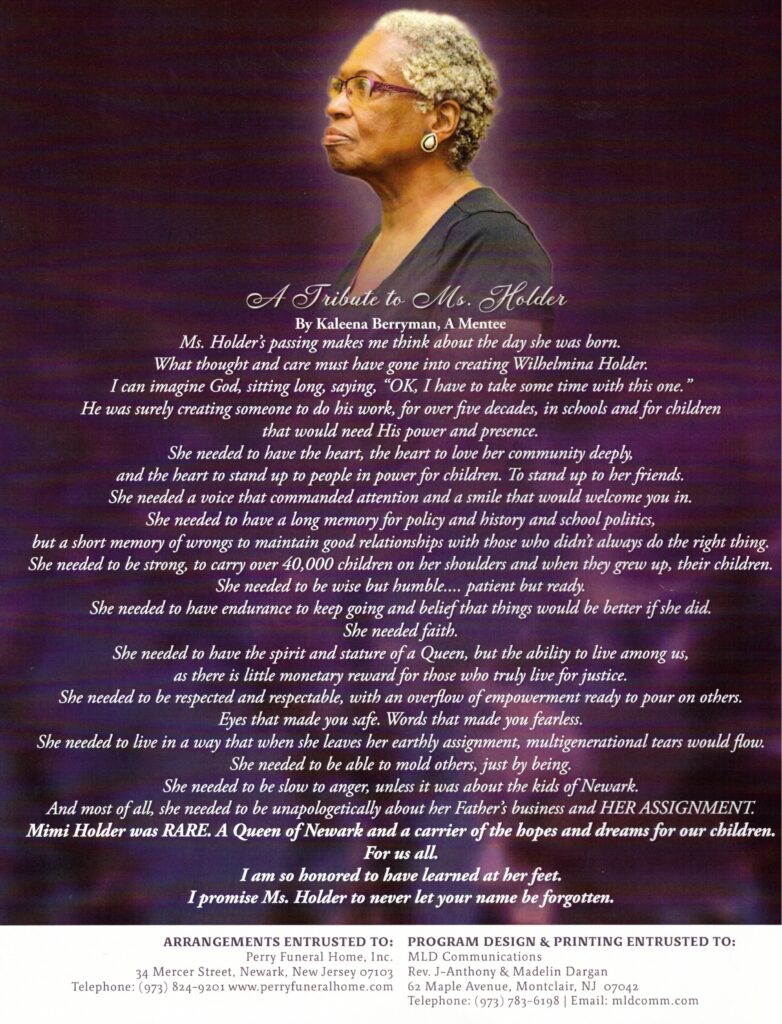
1. Committing to a vision is a primary disposition to hold in the struggle for education justice. We’re instructed, “Where there is no vision, the people perish: but he that keepeth the law, happy is he” (Proverbs 29:18 KJV). Kaleena writes that Ms. Holder had an “unrelenting vision” (2) and “Decades of focus on freedom” (12). No one can articulate what we want for our children better than ourselves. Ms. Holder “held the flame / Of the highest expectations / The school system in her system / Our children, in her lap” (5-8).
2. Speaking truth to power can, and must, occur from all positionalities–parents, teachers, students, community members. And even though we may envision ourselves in one lane, it is when we see ourselves as everyone, when we know the “I” is in “You,” that we can voice our concerns from a collective space. In the poem, Ms. Holder is described as “our Superintendent of Showdowns / Our Principal of Passion / Our Teacher of TELL THE TRUTH / Never ever holding back / Or holding her tongue” (29-33).
3. Sharing the power means dismissing the theory that power is a zero-sum game. Again, seeing the “I” in “You”–when “I” have power, “You” have power. Kaleena writes that “They held the titles, but Wilhelmina held the power” (23) because even when they thought their title entitled them to more power, Ms. Holder was quick to remind. Ms. Holder believed in intergenerational organizing; for those younger coming along with her, “she held us high / Held us close / In the highest regard / She encouraged us / And made us fearless / Through her example” (40-45).
4. Embracing an ethic of care defies the White supremacist logic that has programmed us to look out only for self. Instead of this oppressive logic, Ms. Holder “Fed us / From the flavor in her voice / And the chicken in her bag / And the presence of her integrity” (46-49), and she lovingly held “Tens of schools in the palm of her hands” (13). Care is a precursor to community.
In her shift to a conclusionary call-to-action, Kaleena writes:
“What we must do
Is hold on too
Hold on to her memory
Her love
Her work
Her smile
Each other
Her children and grandchildren
Hold strong to her spirit and all that she left undone
Hold on to her legacy
Her memory
Her mission
All of which can be summed up as
HER LOVE” (54-67)
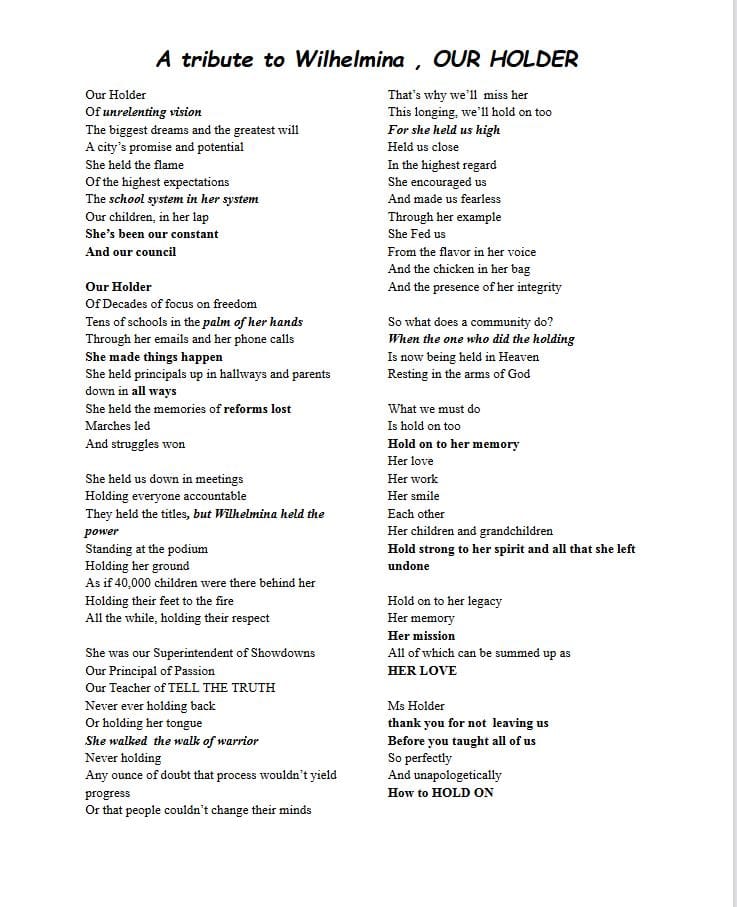
Yes, Ms. Holder, we’ll “hold on too”.
Leave a Comment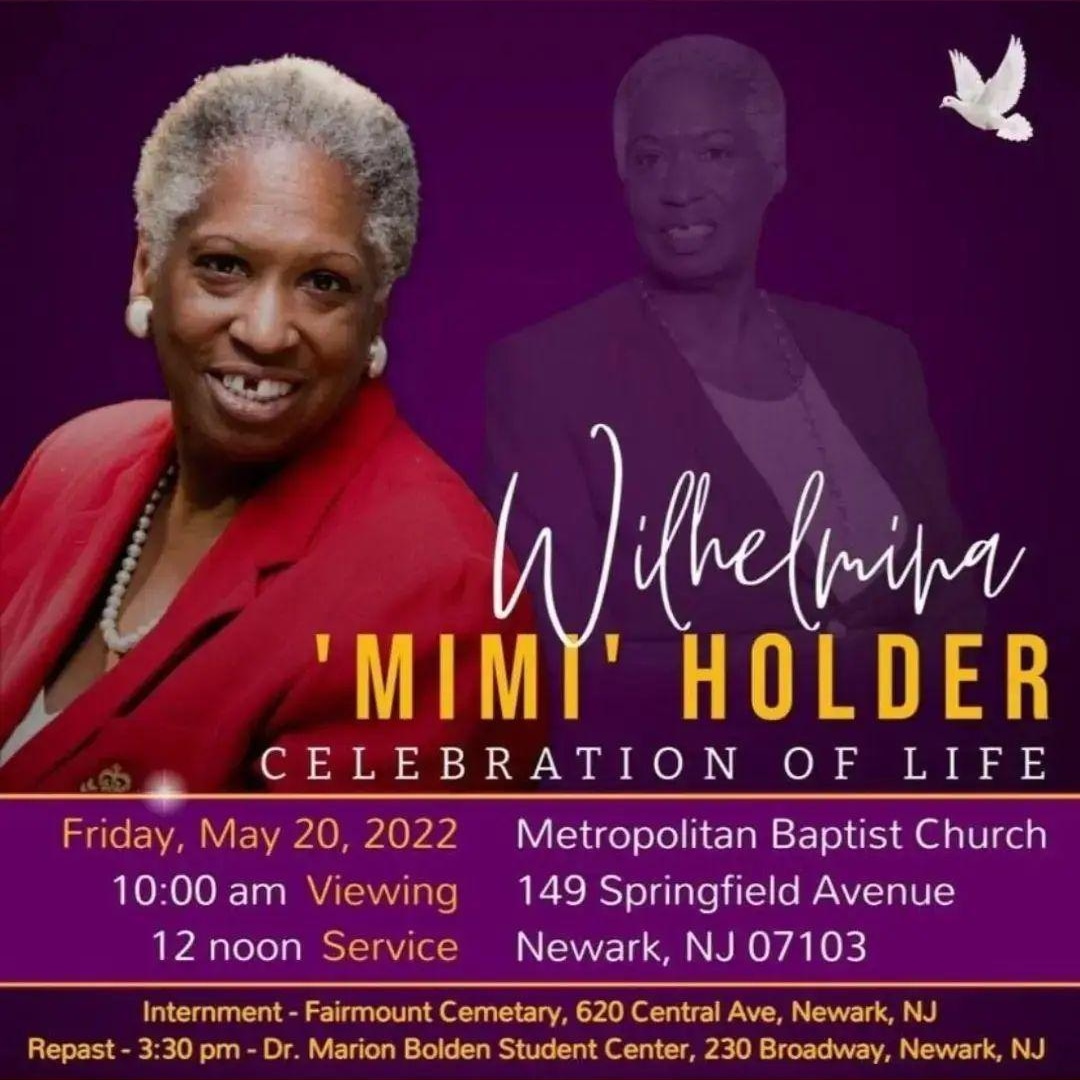

 Even so, I never got to witness youth being taught through critical pedagogy until I became aware of YMS–which stands for Youth Media Symposium and is an integral program of the Abbott Leadership Institute. The high school and middle school students involved in YMS create documentaries and public service announcements on the topic of public education in Newark, NJ. They learn from videography and media professionals how to produce, direct, shoot, edit, and present media projects that have all ended up having a significant impact on the public discourse about public education. I have been interviewed for two such productions–
Even so, I never got to witness youth being taught through critical pedagogy until I became aware of YMS–which stands for Youth Media Symposium and is an integral program of the Abbott Leadership Institute. The high school and middle school students involved in YMS create documentaries and public service announcements on the topic of public education in Newark, NJ. They learn from videography and media professionals how to produce, direct, shoot, edit, and present media projects that have all ended up having a significant impact on the public discourse about public education. I have been interviewed for two such productions–

